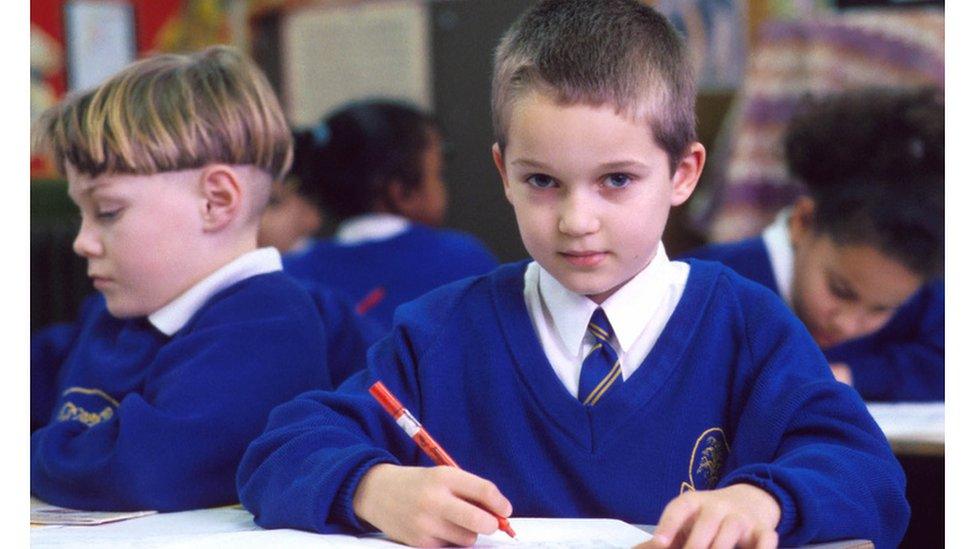Care urged over school 'fairer' funding shake-up
- Published

Urban areas with higher levels of disadvantaged pupils tend to have higher grants
The government should not discount the impact of living in a disadvantaged area on poor pupils' educational chances during the shake-up in school funding, an education charity says.
A Sutton Trust report says attending a school dominated by poor pupils or living in a poor area can harm results.
Ministers are expected to publish plans on "fairer funding" for England's schools soon after the Spending Review.
The government says it wants to ensure that all areas are funded justly.
The report analysed data on the sixth-form qualification patterns of 3,172 children in five regions of England who would have been sitting their A-levels, if they were taking them, in 2014.
Pockets of disadvantage
The report, by Oxford University academics, found the poorest children - those on free school meals - were three times less likely to take three or more A-levels than other students.
White boys from disadvantaged backgrounds did the worst, and among those from poor neighbourhoods some 71% did not continue their academic education after GCSEs.
This compared with 55% of the poorest boys living in more affluent areas not going on to further academic study after GCSE.
Additionally, students from a secondary school with a more disadvantaged intake were also less likely to take A-levels.
As of this year, youngsters are required to stay in education, employment or training after they complete their GCSE year. Some may choose an academic route, while others may go for a vocational course.
Campaigners for what they say will be a "fairer funding" formula for schools argue that the distribution of school grants via local authorities unduly favours those in inner city and urban areas.
They say schools in more rural areas, but still with pockets of disadvantage, are losing out.
'Historic factors'
In a parliamentary debate last week, former Education Select Committee chairman Graham Stuart quoted figures suggesting the 10 best-funded areas had received an average grant of £6,300 per pupil this year, compared with an average of £4,200 per pupil for the 10 most poorly-funded areas.
For a typical secondary school of 920 students, this equated to a budget difference of £1.9m between the best and worst-funded areas, enough to pay the total costs - salaries and pension contributions - of 40 full-time teachers, he said.
Proposals for a fairer funding formula being drawn up by government are designed to address the differences in funding levels between areas based on historic factors.
It was promised by the coalition government in 2011 but has been delayed because of the complexities of the system.
The Sutton Trust report, Background to Success, said: "In the context of creating a fairly funded system, government should also consider the external effects that may combine to compound the effects on pupils from disadvantaged backgrounds, including place poverty (living in neighbourhoods with high proportions of poor children, attending schools serving higher proportions of disadvantaged pupils) gender and ethnicity."
'Uncontroversial'
It adds: "As the government reviews the funding system, including the historic extra resources in such areas, it will be important to recognise the impact of 'double disadvantage' - the way living in a poor neighbourhood can compound the effects of family disadvantage."
But Mr Stuart said: "A deprived secondary school pupil in York who receives the pupil premium - worth fully £935 this year - still has less spent on his or her education than an equivalent pupil in Birmingham who isn't eligible for the pupil premium.
"The principle that pupils with similar characteristics and similar needs should receive similar funding, regardless of where they live, should be uncontroversial.
"It cannot be right that some authorities receive 70% higher funding than others.
"I was very pleased to hear the minister's announcement that we can expect proposals for consultation very shortly - schools in my home area of the East Riding have had to struggle with the consequences of the current unfair system for far too long."
A Department for Education spokesman said: "Too many young people still aren't being given a fair shot to succeed because of where they live, which is why our education reforms are focused on delivering educational excellence everywhere.
"We are ensuring schools are fairly funded and have already maintained per pupil funding and provided an extra £390m to the least fairly funded areas."
The spokesman added that the details of future investment decisions could not be revealed until after this month's spending review.
- Published6 November 2015

- Published18 September 2015

- Published10 November 2015
